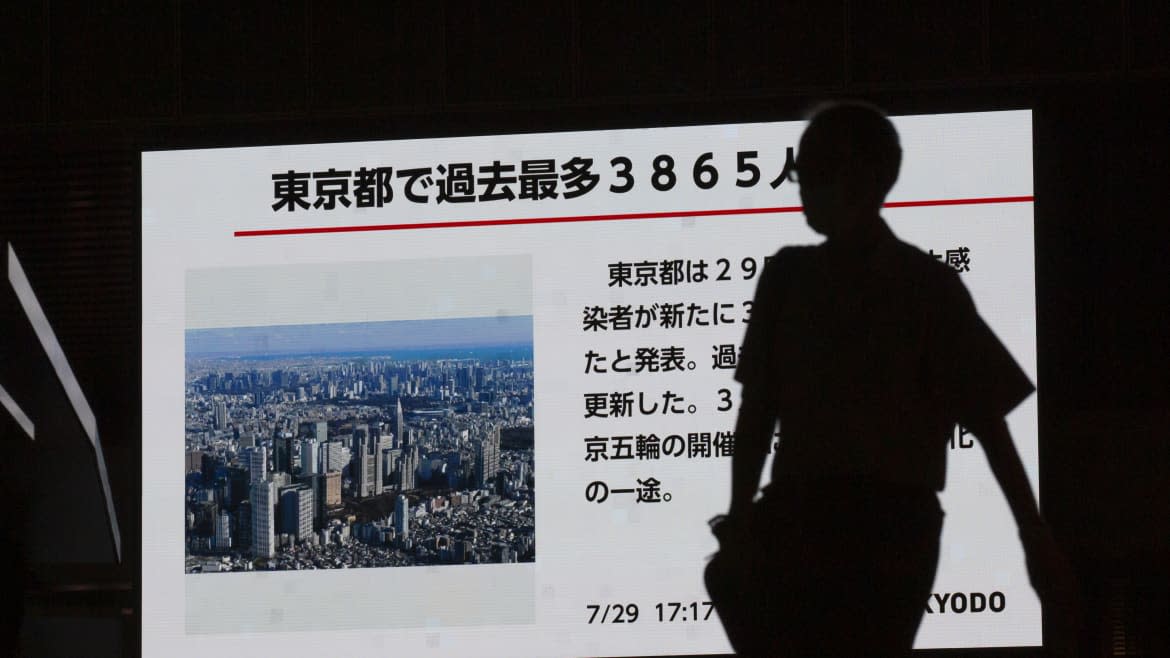Olympic Teams Scramble as Athletes Test Positive and COVID Cases Surge Across Japan

- Oops!Something went wrong.Please try again later.
- Oops!Something went wrong.Please try again later.
- Oops!Something went wrong.Please try again later.
News that two pole vaulters had tested positive for COVID-19 have sent track and field teams into a spin at the Tokyo Olympics, as Japan’s equivalent of Dr. Anthony Fauci warned the government on Thursday that it was time to hit the pandemic panic button.
First to test positive was the American former world champion Sam Kendricks, who was rushed into isolation after failing a PCR test. As the news broke, the 63-strong Australian track and field team—some of whom had trained alongside Kendricks—were briefly locked down in their rooms, although all soon tested negative. “We are all pretty spooked out right now,” said pole vaulter Armand Duplantis, the Swedish world record-holder who had been Kendricks’ main rival at the Games.
Overall, Olympic organizers reported 24 cases for the day—a new high—including three athletes. But that was nothing compared to the surging number of COVID-19 cases outside the Olympic “bubble.” In Tokyo, where cases have been climbing day by day for the past week, there were a record 3,865 new cases after edging past 3,000 for the first time on Wednesday. Japan as a whole, where only about a quarter of the population is fully vaccinated, saw 10,000 new infections.
Shigeru Omi, a top medical adviser who has long questioned the decision to hold the Olympics during a pandemic and pushed organizers into banning spectators from the Games, told a panel of lawmakers that he wanted the government “to send a stronger, clearer message,” the Japan Times reported. “The biggest crisis is that society does not share a sense of risk,” he declared.
Omi is a public-health expert credited with helping to wipe out polio from the Pacific region and a long-time member of the World Health Organization’s executive board. He was among those to warn that the Games, drawing in thousands of athletes, officials, and journalists, risked becoming a superspreader event.
But Japan’s vaccine minister, Taro Kono, told the Associated Press that there was no evidence yet of the virus spreading to the general population from inside the tightly controlled Olympic network. “I don’t think there have been any cases related to the Olympic Games. So we aren’t worried about that issue,” he said.
Inside the Games, athletes have been carrying on as best they can, forced to perform in empty arenas and largely oblivious to continuing anti-Olympic protests. There is a real fear that even a small number of positive tests could seriously undermine the Games’ biggest sport when the track and field finally gets underway at the Olympic stadium on Friday. The organizers’ worst nightmare—that potential champions in key races could find themselves blocked from competing—could yet come true.
Even though all the Australian athletics team returned negative PCR tests after the Hendricks scare, three team members who had reported even casual contact with the American were still ordered to restrict their contacts with teammates. Team officials explained they preferred to display an “abundance of caution” rather than have athletes missing out on medals.
Get our top stories in your inbox every day. Sign up now!
Daily Beast Membership: Beast Inside goes deeper on the stories that matter to you. Learn more.

